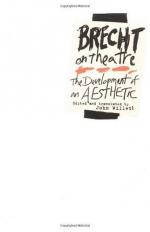|
This section contains 833 words (approx. 3 pages at 400 words per page) |

|
The Relationship between Theatre and Social Change
Brecht's personal and artistic philosophies were entirely intertwined - the personal agenda / impulse was the artistic agenda / impulse, and vice versa. At the core of each of these beliefs was Marxism/Socialism. For Brecht, the personal and artistic goal was power and wisdom for the people, equality (economic, social, political) for all, and the overthrow of what he and like-minded socialists believed to be the elitist social and power structure of the time. In other words, he believed in the power and necessity of transformation, advocated for it, and saw his work as a theatre artist as a necessary component of that transformation. The question, of course, was whether his plays contributed to the emergence of socialist power or were merely a manifestation of it. The point is not made to suggest the two sides of the question are mutually exclusive. On...
|
This section contains 833 words (approx. 3 pages at 400 words per page) |

|




